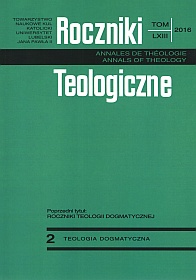Ecological Commandment
Abstract
In May 2015 Pope Francis published the encyclical entitled Laudato Si' about the proper understanding of the issue of ecology. The subject is understood by the Holy Father as one that is most natural, usual and simple, but at the same time obliging everybody, rousing and engaging both in the worldly, popular and everyday sense and in the essentially religious one, which means spiritually and morally absorbing. From the whole of Pope Francis's argument presented in the encyclical it undoubtedly follows that care of the world, also the temporal one, that is ecological life and work, is both a natural and at the same time God's commandment for man, and this means: for each man, both for a believer in God as the Creator of the world, and for a non-believer, but one who is sensible at the basic level of natural law. The Pope suggests adding the theological understanding of ecology to the common one. As a result in Pope Francis's encyclical Laudato Si' we have received a realistic, but at the same time mystic, evangelical approach to ecology, one in the light of Christ, with the simplicity of the truth, of love of life, also of the worldly life, and with the light of beauty – the beauty of God, man, the earth and the universe. Hence, integral ecology is – according to Pope Francis – a commandment given by God to believers and to non-believers, both to the impersonal world, and to the human, personal one. True ecology stems from the reality of creation, from the love of God and man, from man's participation in the work of creation, and finally from the sense of self-preservation of the human being.
References
Franciszek, Encyklika Laudato Si, Watykan 2015.
Benedykt XVI, Encyklika Caritatis in veritate, Watykan 2009.
Benedykt XVI, Jeśli chcesz krzewić pokój, strzeż dzieła stworzenia. Orędzie na Światowy Dzień Pokoju, Watykan 2010.
Feszczyn T., Filozofia i teologia ekologiczna w Polsce w świetle nauczania Jana Pawła II, „Poznańskie Studia Teologiczne” 13(2002).
Grzesica J., Ochrona naturalnego środowiska człowieka. Problem teologiczno-moralny, Katowice 1983.
Jan Paweł II, Encyklika Centesimus annus, Watykan 1991.
Jan Paweł II, Pokój z Bogiem Stwórcą, pokój z całym stworzeniem. Orędzie na Światowy Dzień Pokoju, Watykan 1990.
Teilhard de Chardin P., Zarys wszechświata personalistycznego, tł. M. Tazbir, Warszawa 1985.
Tyburski W., Dyscypliny humanistyczne i ekologia, Toruń 2013.
Copyright (c) 2016 Roczniki Teologiczne

This work is licensed under a Creative Commons Attribution-NonCommercial-NoDerivatives 4.0 International License.





